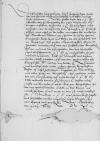Durchlauchter, hochgeborner furst, hochgunstiger, lieber her und freundt. / Unsere freuntliche und vleis willige dinste zuvoran. /
Wir haben diesen tag Ewer Furstlichen Durchlaucht ⌊⌋, / das zu ⌊Konigsberg⌋ den XXII dits / an uns ausgangen, / erhalten, / dorin uns Ewer Furstliche Durchlaucht gunstiger weis anzeigen, / wie die ⌊ersamen von Dantzk⌋ Ewer Furstlichen Durchlaucht bericht gethan, / was negst in der sachen von wegen der vorlegung des marckts von ⌊Soldaw⌋ gen ⌊Mlaua⌋ / durch die herren ⌊konigliche rethe, landt und stedte dis orts⌋ gehandelt, / und an ⌊konigliche maiestet⌋, unsern allergnedigisten herren, geschrieben, / doneben auch, was von hochgemelter koniglichen maiestet vor antwort doruff gefallen, / von uns derhalben freuntlich begerende, / Ewer Furstliche Durchlaucht zu wolgefallen, / zu gut auch eim ersamen rathe zu Dantzke und ⌊diesenn landen⌋, solche newheit abzuwenden / unsern vleis beÿ koniglicher maiestet wolten vorstellen / etc. Dieweil wir dan diese sache neben andern herren ⌊koniglichenn rethen⌋ uf negst gehaltener ⌊tagefart⌋ / zu ⌊Marienburg⌋ mit vleis haben an ⌊konigliche maiestet⌋ gefertigt, / entfinden wir uns schuldig, uff anforderung Ewer Furstlichen Durchlaucht dieselbte vilmehr dan vor zu solicitirn. / Wollen auch solchs mit den ersten, so unser bott von koniglichem hofe, des wir teglich warten, / widder an uns kompt, / ins werck zu setzen, so vil umer in uns ist, / nicht nachlassen, / dan Ewer Furstlichen Durchlaucht viel freuntliche dienste / und derselbten willen wirglich zuvorbrengen sein wir begirig und gevlissen.
